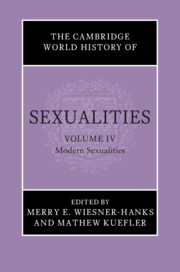Book contents
- The Cambridge World History of Sexualities
- The Cambridge World History of Sexualities
- The Cambridge World History of Sexualities
- Copyright page
- Contents
- Figures in Volume IV
- Contributors to Volume IV
- Editors’ Preface to the Series
- 1 Sexuality and Capitalism
- 2 Colonialism and Modern Sexuality
- 3 Gender, Migration, and Sexuality in the Modern World
- 4 ‘Pornography’, ‘Obscenity’, and the Suppression of Libertine Literature
- 5 Sexuality and the Print Media in the Modern World
- 6 Eugenics, Public Health, and Modern Sexuality
- 7 Sexuality and Consumerism in the Modern World: The Business of Pleasure
- 8 Sex Education in the Modern World
- 9 Birth Control and Reproductive Rights in the Modern World
- 10 The Impact of the World Wars on Modern Sexuality
- 11 Sexualities and Dictatorships of the Twentieth Century
- 12 Sexuality in Post-war Liberal Democracies
- 13 The Sexual Revolution
- 14 Sex Tourism: Fluid Borders of Meanings and Practices
- 15 The History of AIDS since 1981: Medicine, Politics, and Societies in a Pandemic
- 16 Sex Trafficking in the Modern World
- 17 Sex, Law, and Domestic Violence against Women in the Modern World
- 18 Sexuality under Attack Now
- Index
- Contents to Volumes I, II, and III
- References
12 - Sexuality in Post-war Liberal Democracies
Published online by Cambridge University Press: 26 April 2024
- The Cambridge World History of Sexualities
- The Cambridge World History of Sexualities
- The Cambridge World History of Sexualities
- Copyright page
- Contents
- Figures in Volume IV
- Contributors to Volume IV
- Editors’ Preface to the Series
- 1 Sexuality and Capitalism
- 2 Colonialism and Modern Sexuality
- 3 Gender, Migration, and Sexuality in the Modern World
- 4 ‘Pornography’, ‘Obscenity’, and the Suppression of Libertine Literature
- 5 Sexuality and the Print Media in the Modern World
- 6 Eugenics, Public Health, and Modern Sexuality
- 7 Sexuality and Consumerism in the Modern World: The Business of Pleasure
- 8 Sex Education in the Modern World
- 9 Birth Control and Reproductive Rights in the Modern World
- 10 The Impact of the World Wars on Modern Sexuality
- 11 Sexualities and Dictatorships of the Twentieth Century
- 12 Sexuality in Post-war Liberal Democracies
- 13 The Sexual Revolution
- 14 Sex Tourism: Fluid Borders of Meanings and Practices
- 15 The History of AIDS since 1981: Medicine, Politics, and Societies in a Pandemic
- 16 Sex Trafficking in the Modern World
- 17 Sex, Law, and Domestic Violence against Women in the Modern World
- 18 Sexuality under Attack Now
- Index
- Contents to Volumes I, II, and III
- References
Summary
The decades since the Second World War have seen dramatic shifts in the approved varieties of sexual experience in liberal democracies. Sexuality, once regarded as an intensely private matter, is now on display everywhere, on large and small screens. Effective contraception has made what was once primarily a procreative act into a form of recreation, available to both heterosexual and same-sex couples. From being regarded as a privilege of marriage in the 1950s, today access to sex might be regarded as a right. An extreme form of this belief might be seen in the “Incel” movement. Cohesive community ideals about sexuality within marriage disintegrated in the post-war world responding to growing demands to respect a diversity of individual desires. Democracies which hold to faith traditions promote a more traditional view of sex as contained within marriage. The promotion of a responsible sex life has become part of the commitment of many secular liberal democracies to ensure the health and welfare of citizens, particularly in light of AIDS and HPV. Countries have put laws in place to protect citizens from sexual abuse. The global nature of the digital realm, however, makes sexually exploitative visual material difficult to police.
Keywords
- Type
- Chapter
- Information
- The Cambridge World History of Sexualities , pp. 247 - 274Publisher: Cambridge University PressPrint publication year: 2024



